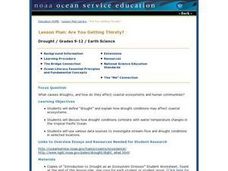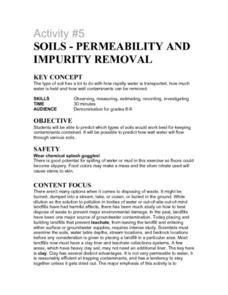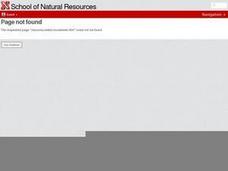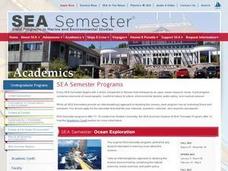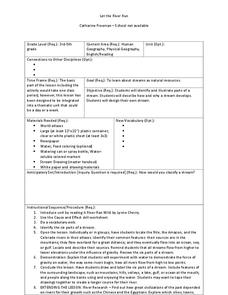Curated OER
Are You Getting Thirsty?
Students study droughts and how they affect communities and coastal ecosystems. In this ecosystems lesson students use data to examine drought conditions in certain areas.
Curated OER
All Hands on Deck: A Harbor Education Program
Young scholars build a model of an estuary. In this wetland lesson, students build a model estuary with a paint tray and modeling clay. They use the model to illustrate the impact of non-point pollution on the watershed.
Curated OER
Create a Hawaiian Tako Lure
Learners create a tako lure. In this Hawaiian culture lesson plan, students research how Hawaiians use natural resources to survive. Learners are introduced to new vocabulary and create an octopus lure.
Curated OER
Water Issues on Puerto Rico and Oahu: A Comparison of Two Islands
Fifth graders explore how the tow islands receive and use fresh water. They also address some of the threats to the fresh water supply on each island. Students explore the lesson objectives through water cycle models and experiments.
Curated OER
Current Interactions
High schoolers design an experiment to see how wind, temperature, and salinity work together to influence ocean currents and present it in a report format. They explain to their classmates how experiment findings relate to ocean currents.
Curated OER
All That Glitters...
Students study that white light (visible light) is comprised of all colors of the spectrum. They study that the quantity of light decreases with increasing depth in the ocean. They study that the quality of light changes with increasing...
Curated OER
Build A Model of the Water Cycle
Students identify and describe the steps in the water cycle. They discover the sun as the source of the cycle. They work together to create their own water cycle model.
Curated OER
Activity #5 Soils-Permeability and Impurity Removal
Students predict which types of soils would work best for keeping contaminants contained. They comprehend that in the past, landfills have been one major source of groundwater contamination. Pupils comprehend that placing and building...
Curated OER
Nautical Terminology
Students read excerpts from Gulliver's Travels and note the nautical terminology. While listening to ocean-themed music, students complete worksheets about sea and boat terms and create their own semaphore system. They challenge fellow...
Curated OER
Sinking Races
Students build plankton models and compete to see which sinks most slowly. They write, or orally present ,the adaptations they incorporated to slow the sinking rate of their organisms. Race results can be grounds for some prizes!
Curated OER
Saving Sturgeon
Marine biology apprentices interpret data of sturgeon interaction with gill nets. They use the data to calculate the percentage of fish entangled in each twine size to discover if there is any correlation. This is a valuable exercise in...
Curated OER
Sheffield Island Adaptation Activity
You don't have to visit The Maritime Aquarium to use this plan, but you would need to find a location where a variety of bird species live, re-write the activity worksheet to incorporate the local species, and purchase field guides for...
Curated OER
Fish Count
In this science worksheet, students read about how scientists determine the total number of fish in a population. Students also participate in a related math activity.
California Academy of Science
Pollution in Our Watershed
The concept of a how pesticides and other chemicals pass through a watershed can be difficult for younger learners to grasp without a concrete example. In the activity here, some blank paper, markers, and a spray bottle are all you need...
Curated OER
Waters of the Earth
Students make a striking visual display showing the distribution of water on earth.
California Polytechnic State University
Australian Geography Unit
At the heart of this resource is a beautifully detailed PowerPoint presentation (provided in PDF form) on the overall physical geography of Australia, basic facts about the country, Aboriginal history, and Australia culture and lifestyle.
Curated OER
Rock My World
Students conduct a hands-on experiment designed to demonstrate how continents and oceans formed and why the manner of formation is relevant to a study of volcanoes.
Ocean Explorer
Architects of the Coral Reef
Coral Reefs are the focus of a life science lesson plan. Upper graders look at how coral reefs are formed, how the animals and plants reproduce, and the variety of ways that humans benefit from coral reefs around the world. Groups of...
Curated OER
Water in the Environment
In this water in the environment worksheet, students match 10 terms related to water to their definitions. They identify 10 sentences as true or false related to groundwater, layering and landfills. They fill in the blanks for 2...
Curated OER
Observing Brine Shrimp
Pupils observe brine shrimp eggs, create an appropriate environment for their survival, and observe their growth.
Curated OER
The Beluga Whale, Otters
In these internet activity worksheets, learners complete research related to the Beluga Whale and otters. Student are able to answer questions by following directions to help them navigate around a website.
Curated OER
The Great Water Hunt
Students examine a globe to locate the bodies of water present and create a representation of those bodies of water for further exploration of the concept. Extensions of their observations are made at school, home, and the community.
Curated OER
Let the River Run
Students explore the environment by reading a story in class. In this water formation lesson, students define environmental terms such as rivers, streams, gulf, oceans and lakes. Students read the story A River Ran Wild and discuss the...
Curated OER
Bycatch
Bycatch is the unwanted and discarded marine life caught during commercial fishing. Young marine scientists review bycatch litigation and analyze graphs of bycatch data and answer questions about it. This raises awareness while...


